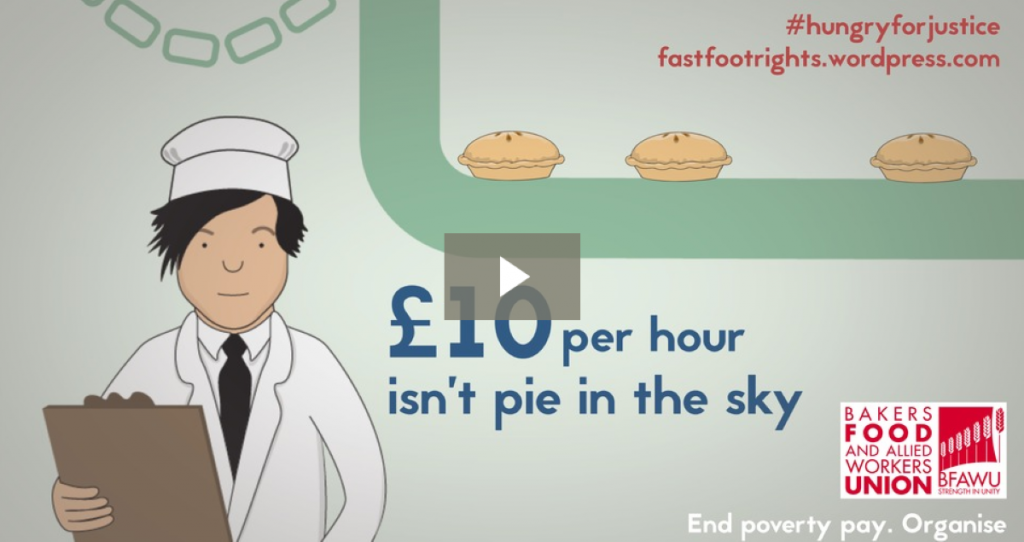£10 per hour isn’t pie in the sky
£10 per hour isn't pie in the sky – Bakers Food and Allied Workers Union
The minimum wage should be increased to £10 per hour so that working people do not have to be supported with benefits, says the Bakers Food and Allied Workers Union (BFAWU).
It wants the practice employed by large corporations to cut pay and force workers to rely on state handouts to be brought to an end.
By making work pay and providing a living wage, five million people would be lifted out of poverty and the ballooning benefit bill would be reduced, says the union.
The money saved could then be diverted to help fund the NHS and improve communities.
BFAWU is launching a new animated video to help spread the message that £10 per hour is not pie in the sky. Part of the Fast Food Rights campaign, the video will be launched at a rally in Newcastle on February 19th 2015. Supporters are being encouraged to share the animation using the hashtag #hungryforjustice.
Script
Low pay makes daily life a struggle for millions of people across the UK.
Over recent years living costs have soared while average wages have failed to keep up.
In the past ten years alone, energy costs have risen eight times higher than earnings (1) forcing millions to choose between heating their homes or putting food on the table.
Housing costs have also soared. Average rents are now at an all time high (2) with the prospect of buying a home now an impossible dream for growing numbers of people.
With food prices also up 44% since 2005, growing numbers of people have been forced to rely on food banks. Almost a million people visited a food bank this year according to the Trussel Trust (3), with one in five of those who did, saying their pay packets simply weren't enough to cover their weekly shop.
Even just getting to work has become a struggle for many. Rising fuel costs and government cuts to public transport subsidies means that on average around one in every eight pounds we now earn is spent on travel costs (4).
But while living costs have continued to stack up, our pay packets have not. Last year the average wage grew by just £1 a week (5).
This increasing failure by employers to pay their workers enough to live on has increasingly left taxpayers picking up the bill.
The government now spends around £3.6 billion a year topping up poverty wages through tax credits, with other in-work benefits also adding to the bill.
With further welfare cuts likely, the need to increase wages has never been greater.
If all employers paid their workers at least £10 an hour it would transform the lives of people right across the UK.
Commuters would no longer be forced to take long journeys to work, just to save on the cost of a train ticket.
Families would no longer be forced to resort to food banks just to feed their kids healthy, nutritious meals.
Employers would benefit from a more motivated workforce and the economy would benefit from millions of people with more money to spend.
Lifting people out of poverty by ensuring they earn a decent living wage isn’t pie in the sky.
Notes
1. http://www.citizensadvice.org.uk/index/pressoffice/press_index/press_20131117.htm
2. http://www.theguardian.com/money/2014/sep/19/rents-rise-all-time-average-high-august-uk
3. http://www.trusselltrust.org/stats
4. http://www.ons.gov.uk/ons/dcp171766_297746.pdf
5. http://news.sky.com/story/1376132/uk-workers-got-pay-rise-of-just-1-last-year





-01.png)